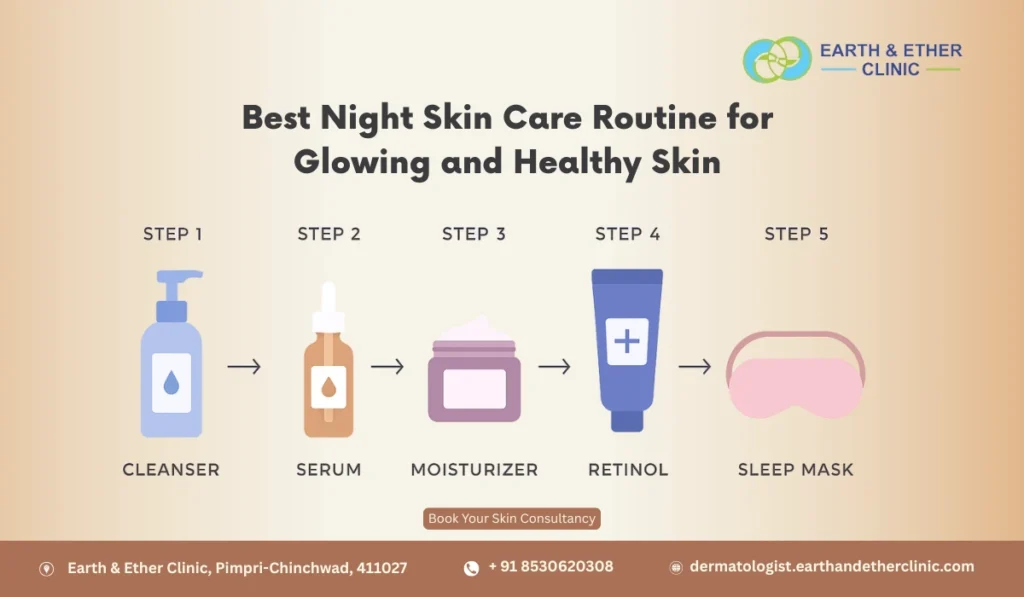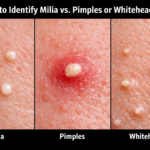A good night skin care routine for healthy and glowing skin is one of the most powerful ways to transform your skin. While you sleep, your skin goes into repair mode—cell turnover increases, collagen production rises, and the skin heals from daytime stress such as pollution, sun exposure, makeup, and dust.
If you give your skin the right support at night, you’ll notice improved glow, better hydration, smooth texture, fewer breakouts, and even early anti-ageing benefits.
This in-depth guide covers:
- Why nighttime skincare matters
- Step-by-step dermatologist-approved night routine
- Skin-type-specific routines (dry, oily, combination, sensitive, acne-prone)
- Common mistakes to avoid
- FAQs
- When to visit a dermatologist in Akurdi
Let’s begin.
Why Is a Night Skin Care Routine Important?
At night, your skin gets a chance to rejuvenate. Here is what happens while you sleep:
1. Faster Cell Regeneration
Skin cells repair damage from UV rays and pollution.
2. Higher Collagen Production
Nighttime is when collagen—responsible for firmness and youthfulness—gets repaired.
3. Less Exposure to Environmental Stress
No sunlight, dust, sweat, or makeup = better absorption of actives.
4. Better Hydration Retention
Using the right ingredients prevents moisture loss, reducing dryness and fine lines.
A good night routine helps your skincare products work two to three times more effectively.
The Best Night Skin Care Routine
Below is the simplest yet most effective dermatologist-approved routine suitable for all skin types. You can add or remove steps depending on your needs.
Step 1: Remove Makeup (If worn) – The Double Cleanse Rule
Even if you don’t wear makeup, sunscreen and dust stick to the skin.
Best removers:
- Micellar water
- Cleansing balm
- Oil cleanser
Why this matters
Leaving makeup or sunscreen overnight clogs pores, causes acne, and accelerates ageing.
Step 2: Use a Gentle Face Cleanser
Follow up with a mild, pH-balanced cleanser suitable for your skin type.
What a good cleanser does:
- Removes sweat & impurities
- Balances oil
- Prepares skin for treatment serums
Avoid:
❌ Harsh foaming cleansers
❌ Soaps (very drying)
Step 3: Exfoliate (1–2 times a week)
Exfoliation helps remove dead skin and boosts product absorption.
Types:
- Chemical exfoliants (AHAs, BHAs, PHAs): Best & safest
- Physical scrubs: Avoid unless extremely gentle
Benefits:
- Smooth texture
- Less acne
- Faster glow
⚠️ Do NOT exfoliate daily.
Step 4: Apply Treatment Serums
This is the most important part of your night routine. Choose serum based on your skin concern.
Best Night Serums (Choose 1 or 2)
For brightening:
- Vitamin C (if not using retinol)
- Niacinamide
- Alpha arbutin
For anti-ageing:
- Retinol
- Bakuchiol (gentle alternative)
For acne & pigmentation:
- Salicylic acid
- Mandelic acid
- Azelaic acid
For hydration & repair:
- Hyaluronic acid
- Ceramide serums
- Peptides
Step 5: Eye Cream (Optional)
Use if you have:
- Dark circles
- Puffiness
- Fine lines
Ingredients to look for:
- Caffeine
- Retinol (very mild)
- Peptides
- Vitamin K
Step 6: Moisturizer – Lock in Hydration
A night cream or moisturizer supports overnight healing.
Choose based on skin type:
- Dry skin: Ceramides + hyaluronic acid + shea butter
- Oily skin: Gel-based, non-comedogenic
- Combination skin: Lightweight lotion
- Ageing skin: Peptides + retinol-based night cream
Moisturizer prevents water loss and keeps the skin barrier strong.
Step 7: Optional – Facial Oil
For extremely dry or flaky skin.
Options:
- Rosehip oil
- Argan oil
- Squalane oil
Apply only after moisturizer.
Step 8: Lip Care
Don’t ignore your lips.
Use a thick lip mask or petroleum jelly.
Night Skincare Routine for Each Skin Type
DRY SKIN
- Oil-based cleanser
- Gentle hydrating face wash
- Hyaluronic acid serum
- Ceramide-based moisturizer
- Face oil (optional)
Tips
- Avoid alcohol-based toners
- Use a humidifier if possible
OILY SKIN
- Gel-based cleanser
- Niacinamide or salicylic acid serum
- Lightweight gel moisturizer
Tips
- Double cleanse every night
- Use clay mask 1–2 times weekly
COMBINATION SKIN
- Gentle cleanser
- Use salicylic acid on T-zone
- Hydrating serum on dry areas
- Lightweight moisturizer
ACNE-PRONE SKIN
- Salicylic acid face wash
- Niacinamide + salicylic serum
- Gel moisturizer
Tips
- Avoid coconut oil
- Avoid scrubs
- Spot treat with benzoyl peroxide
SENSITIVE SKIN
- Hypoallergenic cleanser
- Centella or ceramide serums
- Fragrance-free moisturizer
Tips
- Avoid retinol unless prescribed
- Patch test everything
Common Night Skincare Mistakes to Avoid
- Sleeping with sunscreen or makeup
- Using too many active ingredients together
- Over-exfoliating
- Applying retinol on damp skin (causes irritation)
- Mixing vitamin C with retinol
- Switching products too frequently
How to Create the Perfect Night Routine
✔ Write in simple steps users can follow
✔ Include specific product categories
✔ Answer common questions quickly
✔ Provide solutions for each skin type
✔ Include local expertise & dermatologist recommendation for SXO
When Should You Consult a Dermatologist?
Visit a dermatologist in Akurdi if you experience:
- Persistent acne
- Pigmentation that keeps returning
- Skin dryness not improving
- Sudden breakouts or irritation
- Signs of premature ageing
A professional can personalize your night routine based on your skin condition. If you are in PCMC, you can book an appointment with a dermatologist in Akurdi for tailored skincare treatment and advanced procedures.
FAQs
1. What is the correct order of night skin care?
Cleanser – Remove makeup, dirt, and oil.
Toner – Balance skin’s pH and prep for next steps.
Serum – Apply targeted treatment (e.g., for acne, pigmentation, or hydration).
Eye Cream – Gently nourish the under-eye area.
Moisturizer – Lock in hydration and repair the skin barrier.
Night Cream or Face Oil (optional) – Add extra nourishment if your skin is dry.
2. Should I use retinol every night?
No, you shouldn’t use retinol every night, especially if you’re new to it.
Start with 2–3 times a week to let your skin build tolerance. Gradually increase frequency as your skin adjusts. Overuse can cause dryness, redness, or peeling.
3. Can I use vitamin C at night?
Yes, you can use Vitamin C at night, but avoid using it together with retinol in the same routine.
Vitamin C helps brighten skin, reduce pigmentation, and boost collagen, making it effective both morning and night. However, when combined with retinol, it may cause irritation or sensitivity.
4. Is moisturizer necessary at night?
Yes, moisturizer is essential at night.
During sleep, your skin repairs and regenerates. A good night moisturizer helps to:
– Lock in hydration
– Support skin barrier repair
– Prevent dryness and flakiness
– Enhance absorption of other skincare products
5. What time should I apply my night routine?
The best time to apply your night skin care routine is between 8:00 PM and 10:00 PM, ideally 30 minutes before bed.
This timing allows your skin to absorb products fully before you sleep and supports the skin’s natural repair cycle, which is most active overnight.
Conclusion
A good night skincare routine is a long-term investment in your skin health. When you nourish your skin at night, you speed up healing, boost glow, reduce ageing signs, and improve overall texture.
Start with the basics—cleanser, serum, moisturizer—and build up only if needed.
If you want a personalized nighttime routine or professional treatments, book a consultation with an experienced dermatologist in your area for the best results.
Read Here: Morning Skin Care Routine for Glowing Skin





